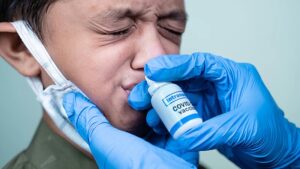Since the introduction of COVID-19 variants like delta and omicron, researchers have been working feverishly to investigate whether existing immunizations and boosters are still effective against new strains of the SARS-Cov-2 virus.
A new reaction to the quickly changing virus may be discovered directly at the entrance to our lungs, according to Yale’s Akiko Iwasaki, who holds the Waldemar Von Zedtwitz Professor of Immunobiology position.
A new study by her and her colleagues discovered that intranasal vaccination gives broad-based protection against heterologous respiratory viruses in mice, whereas so-called systemic immunization, which involves injecting a vaccine into the body to elicit body-wide immunity, did not.
Their findings were published in the journal Science Immunology on the 10th December 2021).
A senior author of the study, Dr. Iwasaki stated that “the finest immune resistance occurs at the gate,” defending against viruses attempting to enter the body.

Mucous membranes have their own immune defense system that protects against germs that are spread through the air or food. After being challenged, these barrier tissues secrete immunoglobin A (IgA) antibodies, which are then recognized by the immune system.
When compared to vaccines, which evoke a system-wide immune response, IgA antibodies function locally on the mucosal surfaces of the nose, stomach, and lungs, among other places.
Read More: 2 Sharks Are Ready to Swallow Retiree’s Social Security Payments in 2022
The protective role of IgA-producing cells in combating intestinal pathogens was well documented, but Iwasaki’s laboratory questioned if inducing an IgA response may also result in a localized immune response against respiratory viruses.
The researchers collaborated with researchers at the Icahn School of Medicine at Mount Sinai in New York to test a protein-based vaccine designed to jumpstart an IgA immune response in mice. They administered the vaccine to the mice through injections, as is commonly done with systemic immunizations, and also through intranasal administration.
After that, they exposed the mice to a variety of influenza virus strains. They discovered that mice who had received the vaccination intranasally were significantly more protected against respiratory influenza than mice who had received injections of the vaccine.
Nasal vaccinations, but not the shot, generated antibodies in the animals that protected them against a variety of flu strains, not simply the ones against which the vaccine was intended to protect them.
Read More: What You Need to Do to Get IRS $1,800 Stimulus Check?
Yale researchers are currently testing nasal vaccine strains against COVID viruses in animal models, which they hope to complete this year.
According to Iwasaki, while both vaccination injections and nasal vaccines boosted antibody levels in mice’s blood, only the nasal vaccine permitted IgA released into the lungs, where respiratory viruses must lodge in order to infect the host.
If the nasal vaccines are found to be safe and effective in humans, Iwasaki envisions them being used in conjunction with current vaccines and boosters that act across the body in order to add immune system reinforcements at the site of illness, similar to how antibiotics function.

